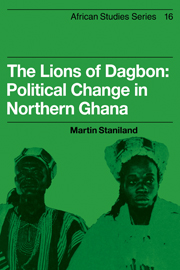Book contents
- Frontmatter
- Contents
- List of maps, figures, and tables
- Preface
- Abbreviations and glossary
- Map 1 Northern Ghana, 1965
- 1 The country and the people
- 2 Dagbon
- 3 Colonial rule, 1899–1930
- 4 Dagomba divided and united, 1899–1930
- 5 The battle of Watherston Road
- 6 Dagomba politics under indirect rule, 1932–1947
- 7 Votibu
- 8 Party politics
- 9 The Yendi tragedy
- 10 Conclusions
- Appendixes
- Notes
- Bibliography
- Index
2 - Dagbon
Published online by Cambridge University Press: 04 August 2010
- Frontmatter
- Contents
- List of maps, figures, and tables
- Preface
- Abbreviations and glossary
- Map 1 Northern Ghana, 1965
- 1 The country and the people
- 2 Dagbon
- 3 Colonial rule, 1899–1930
- 4 Dagomba divided and united, 1899–1930
- 5 The battle of Watherston Road
- 6 Dagomba politics under indirect rule, 1932–1947
- 7 Votibu
- 8 Party politics
- 9 The Yendi tragedy
- 10 Conclusions
- Appendixes
- Notes
- Bibliography
- Index
Summary
Idleness and frivolous gatherings around the king or a chief to prattle and to ‘flatter’ him seem to be the delight and duty of the nobility in the eyes of the Dagbambas, so much so that in Yendi, any grown-up men are all chiefs in their own estimation … unless a stern regime prevails, these frivolous noblemen would remain truculent and mock at authority.
This chapter is concerned with the structure and dynamics of Dagomba politics in the pre-colonial age. As an exercise in reconstructing ‘traditional’ society, it is liable to produce an excessively rigid and formalised model, since it is so hard to distinguish in retrospect between what was important and what was trivial and flexible. Further, although the intervening period of colonial rule did bring about a great increase in foreigners’ knowledge of pre-colonial government, the ‘conservationism’ practised by some administrators led to a certain fossilisation of ‘traditional’ politics, to a mummification of the body politic in a wrapping of ethnography. The ‘indirect rulers’ sometimes killed the thing they loved: that is, they destroyed the essential dynamics of ‘archaic’ societies by heavily administered efforts to preserve formal institutions and procedures. For, as Peter Lloyd writes, ‘In the colonial territory and the modern independent state it is often the rituals and ceremonies which have survived, while the traditional decision-making processes have been irrevocably changed.’
In depicting Dagomba political organisation we are immediately involved in conceptual problems which are familiar to political anthropologists. Among these problems are the definition and isolation of ‘the political sphere’ and the characterisation of the traditional state.
- Type
- Chapter
- Information
- The Lions of DagbonPolitical Change in Northern Ghana, pp. 13 - 38Publisher: Cambridge University PressPrint publication year: 1975

